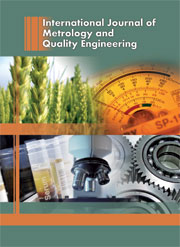Crossref Citations
This article has been cited by the following publications. This list is generated based on data provided by
Crossref.
Fontanella, Rita
Accardo, Domenico
Caricati, Egidio
Cimmino, Stefano
and
De Simone, Domenico
2016.
An extensive analysis for the use of back propagation neural networks to perform the calibration of MEMS gyro bias thermal drift.
p.
672.
Fontanella, Rita
Accardo, Domenico
Caricati, Egidio
Cimmino, Stefano
De Simone, Domenico
and
Lucignano, Giovanni
2017.
Improving Inertial Attitude Measurement Performance by Exploiting MEMS Gyros and Neural Thermal Calibration.
Fontanella, Rita
Accardo, Domenico
Moriello, Rosario Schiano Lo
Angrisani, Leopoldo
and
Simone, Domenico De
2018.
An Innovative Strategy for Accurate Thermal Compensation of Gyro Bias in Inertial Units by Exploiting a Novel Augmented Kalman Filter.
Sensors,
Vol. 18,
Issue. 5,
p.
1457.
Nazdrowicz, Jacek
Szermer, Michal
Stawinski, Adam
and
Napieralski, Andrzej
2018.
Modelling and simulation thermal expansion phenomena in MEMS gyroscope.
p.
1.
Fontanella, Rita
Accardo, Domenico
Lo Moriello, Rosario Schiano
Angrisani, Leopoldo
and
De Simone, Domenico
2018.
MEMS gyros temperature calibration through artificial neural networks.
Sensors and Actuators A: Physical,
Vol. 279,
Issue. ,
p.
553.
Nazdrowicz, Jacek
and
Napieralski, Andrzej
2019.
Temperature Change Leverage on Performance of MEMS Rotational Motion Sensors.
p.
90.
Nazdrowicz, Jacek
and
Napieralski, Andrzej
2019.
Spring Constants and Damping Coefficient Temperature Dependency Analysis for Actuating and Sensing in Vibratory Microsensors.
p.
1.
Li, Haiwang
Zhai, Yanxin
Tao, Zhi
Gui, Yingxuan
and
Tan, Xiao
2019.
Thermal Drift Investigation of an SOI-Based MEMS Capacitive Sensor with an Asymmetric Structure.
Sensors,
Vol. 19,
Issue. 16,
p.
3522.
Nazdrowicz, Jacek
and
Napieralski, Andrzej
2020.
Thermal Expansion Phenomena and Influence on Damping Coeffcient and Stiffness Variation for MEMS Kinematic Quantity Microsensors and Microactuators.
p.
1246.
Nazdrowicz, Jacek
and
Napieralski, Andrzej
2020.
Analysis of Temperature Variation Influence on Capacitance Inertial Sensors Parameters.
p.
1364.
Xiao, Pengbo
Qiu, Zhinan
Luo, Yiming
Pan, Yao
Qu, Tianliang
Yang, Kaiyong
Luo, Hui
and
Qin, Shiqiao
2020.
Influence of Temperature Variation on the Vibrational Characteristics of Fused Silica Cylindrical Resonators for Coriolis Vibratory Gyroscopes.
Sensors,
Vol. 20,
Issue. 4,
p.
1032.
Tu, Yi-Hsuan
and
Peng, Chao-Chung
2021.
An ARMA-Based Digital Twin for MEMS Gyroscope Drift Dynamics Modeling and Real-Time Compensation.
IEEE Sensors Journal,
Vol. 21,
Issue. 3,
p.
2712.
Nazdrowicz, Jacek
Jankowski, Mariusz
Stawinski, Adam
and
Napieralski, Andrzej
2022.
Analysis of temperature variation influence on damping coefficient and Q-factor of 2-DOF vibratory rotational velocity sensor.
p.
1.
Aung, Ye Ko Ko
Simonov, Boris M.
Timoshenkov, Sergey P.
Tun, Phyo Win
and
Thu, Paing Soe
2023.
Modeling and Analysis of the Functioning of the Sensitive Element of a Capacitive Microaccelerometer Based on the Microstructure of Silicon Carbide(Sic) and Silicon(Si).
p.
139.


